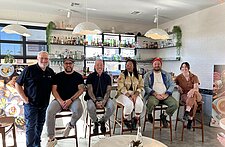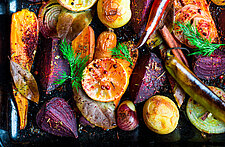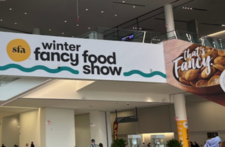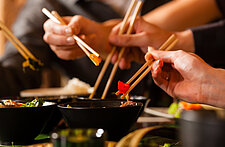By Brad Ross, Global Trend Forecasting
Society today is an advocate of speed: it's short on quality but big on quantity. The motto is bigger not better. As a result, we’re beginning to contemplate the richness of going slow. This is about living in the moment, experiencing the now and tackling our “always-on”, tech-filled, 24/7 lives.
Trend forecasting in its simplest form is recognizing and quantifying currents of interest or preferences within a group of things. In my world of fashion forecasting, it is generally said that every trend has its counter trend, however this is not entirely correct. A more accurate description is that trends, whatever genre, have a lifecycle that follow the bell curve. For example, this is how I explain the lifecycle of a trend: (See picture below left)
What many call a counter trend are simply the trendsetters or early adopters bringing “IN” something different to where we have been (i.e. “Incoming”).

You’re probably wondering what this has to do with the slow movement. Everything. The slow movement is “incoming” and set in a world of speed to market and Moore’s Law of technological inventions. The slow movement is a growing phenomenon. We’ve seen slow food first and now we're starting to see slow travel and slow fashion. The movement is encouraging a more thoughtful approach to slowing down, taking our time and placing a renewed focus on the benefits of quality over quantity. It means working smarter, not harder, nor faster.
CLICK HERE to view Trend Perspectives: Who is Gen Z?
I’ll start with food. Slow Food is a reaction to the ubiquitous fast food wave. It all started with Carlo Petrini in 1986 when he rallied against the opening of a McDonald’s in Rome. His concern was the real impact it would have on farming and food traditions. His goal, along with other food lovers, was to preserve regional cuisine and maintain a slower pace of life.
Today, it is a worldwide philosophy to celebrate good, clean and fair food. Slow Food is about cooking from scratch, sourcing in-season ingredients that have been thoughtfully harvested and responsibly grown, thus allowing us to reconnect around our kitchen tables. Despite its quiet approach, this movement is going global with restaurants and regional chapters promoting its ethos.
Good: Delicious food created with care from healthy plants and animals.
Clean: Nutritious food that is as good for the planet as it is for our bodies.
Fair: Food that is fair and accessible to all, regardless of income, produced by people who are treated with dignity and justly compensated for their labor.
With more weight being placed on what we eat and where it comes from, the movement is trickling into business blueprints too. The slow-mo effect on the coffee industry can be seen in KINTO Co. brand position and products.

As contrary as it sounds, the movement is also infiltrating travel. Slow travel is not so much a particular mode of transportation as it is a mindset. Travelers are looking to take their time and go to one place as opposed to many. Less concerned with checking off the tourist hotspots, travellers want to open their eyes and ears to the wonders around them in a slow and responsive way.
The travel writer Pico Iyer explains it this way: “The essence of holidays, and therefore travel, is to get what you don’t get enough of the rest of the time. And for more and more of us, this isn’t movement, diversion or stimulation; we’ve got plenty of that in the palms of our hands. It’s the opposite: the chance to make contact with loved ones, to be in one place and to enjoy the intimacy and sometimes life- changing depth of talking to one person for five minutes of 15 hours”.
CLICK HERE to view Coffee Trends for 2016 and Beyond
There is also a surge of slow-moving brands emerging in the apparel arena. The primary initiative is to slow down consumption. Along with LENA the Amsterdam-based Fashion Library, which I referenced last month in the Sharing Economy, another example is seen in the pop-up shop Hacked also in Amsterdam. Hacked reclaims the clothing of fast fashion brands, effectively using their leftover items, deconstructing the garments and designing them into new shoes, bags, knitwear and jerseys. This is all with the intention of providing an alternative to fast fashion chains.

And last but not least, another exciting new brand that is mastering the art of the slow-made movement is STORY. STORY is a retail concept that takes on a magazine-like point of view, which changes like a gallery and sells things like a store.
“We don’t work seasonally and in some cases the fabric alone takes years to develop. We wait until everything is absolutely perfect before offering it to you”.
Founder, Rachel Shechtman
An alternative to fast fashion, it focuses on slow manufacturing, ethical sourcing and season-less product drops.
More aware of the consequences of fast-fashion production, the slow movement is opposed to pumping out products and is against all things quickly and cheaply produced. As Maxine Bédat, co-founder of slow fashion e-store Zady, also known as “The Whole Foods of Fashion”, states: "In our globalized and hyper-connected, instantaneous world, slow fashion is a return to the tangible and real."
Though I’ve only cited three examples, this trend is also found in a myriad of other genres such as, Slow Tech, Slow TV, Slow Living, Slow Design and Slow Print.
While today we are entrenched in an hurried culture, with the mindset of, “quicker is better”, there is a seemingly counter response of our current “drive through society.” And that incoming trend is, Slow.
Fore more trend information, CLICK HERE to subscribe to the weekly in-sight newsletter!




